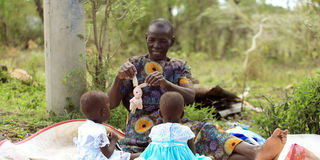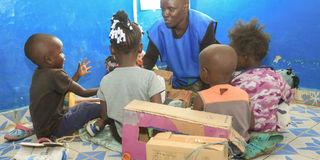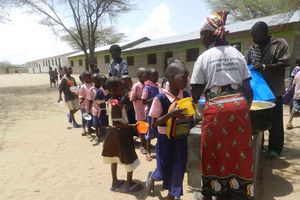How Lake Region counties are helping babies survive and thrive

Ms Consolata Akeyo plays with her twin granddaughters at her home in Kisumu on November 18,2024. The elderly woman, also the girl's caregiver, says through the Naturing Care Programme, she has learnt the importance of bonding with her granddaughters while playing.
What you need to know:
- The first 1,000 days of a child’s life, calculated from conception to the second birthday, are the most critical window period for their development and health.
Baby Virginia Cate plays with other children at a kid’s corner in Orongo Dispensary, Kisumu County, as her mother, Maureen Akoth, attends a child care training programme offered at the facility. It is not Maureen’s first time here. Over a year ago, she enrolled in the dispensary’s Nurturing Care Programme –one which has changed her parenting and improved her daughter’s quality of life. Cate was only a year old when her mother joined the programme.
“It is here that I learned how to take care of, feed, and bond with my child,” she tells Healthy Nation.
Going by the standards of most local dispensaries, Orongo is a busy facility.

Ms Helida Achieng, a Community Health Promoter, plays with children at Orongo health centre's play corner on November 21, 2024. The play station is often utilised by the children and their mothers during the routine antenatal care visits at the facility.
When we get there on a Thursday morning, there are long queues, with clients waiting to be attended to.
It strikes us that mothers attending the routine Antenatal Care (ANC) clinic like Maureen, together with their children, feel at peace being at the dispensary.
Locally assembled toys made from plastic bottles, clothes, and boxes are lined up in the play area.

Ms Emelisia Awiti, a nurse at Orongo dispensary, during the interview at her office on November 18,2024.
We learn that the play items were made by the Community Health Promoters (CHPs) attached to the facility.
“We have always recorded long queues here. The play corners play a major role in keeping the children and their caregivers entertained and distracted. It also offers room for the mothers to bond with the babies,” Emelesia Awiti, a nurse at the Orongo Dispensary maternal child health section, explains.
Maureen has been consistent. Recently, her daughter Cate completed all the required early childhood immunisation routine, but she still visits the facility for a general baby wellness check-up.
The 32-year-old tells Healthy Nation that the programme does not end at facility level. A Community Health Promoter regularly visits her home to check on her and the baby.
“During one of the visits, while probing about my child’s wellness, the CHP realised that my child’s weight had dropped and started inquiring what could have been the challenge,” says Maureen
Little Cate also lacked appetite. To boost her food intake, Maureen had tried self-medication and opted to give her child multivitamin tablets that did not work.
The mother says while she had also realised that the baby’s weight had been declining, she did not give it much thought.
The CHP would then advise the mother to take the child to the nearest health centre to seek medical attention, only to learn that baby Cate needed to be dewormed.
“This was not the case for my first two children. One of them missed a vaccine since I was always held up with house chores or running my beauty shop business,” she tells Healthy Nation.
The mother also says that she has realised the importance of creating time to play with her child daily through the training.
One of the mother's significant steps was to hand-make different toys for her daughter. During their playtime, Maureen says she can always tell any changes in her child’s body or health.
Fast learner
Maureen says playing with Cate makes her active; the baby has grown into a fast learner.
“I always play with her moments before feeding; that has greatly improved how she eats,” says Maureen.
A five-minute walk from the health centre, Consolata Akeyo enjoys playtime with her twin granddaughters.
The elderly lady reveals that since birth, she has actively cared for the two girls as their mother works.
Before, she tells us that caring for her grandchildren was challenging as she struggled with feeding and connecting with the babies.
“Early last year, I was invited to attend the Nurturing Care Programme training by a CHP after realising that I was the twin girl’s caregiver,” she says.
Consolata says that through the programme, she learned how to feed the twin girls, who had just been introduced to solid foods.
The trainers also ensured that the elderly lady stayed informed about the girls' vaccination schedule if the mother forgot to immunise the children.
“Both girls have received all their vaccines, and I am proud to have played a part in their general upbringing,” she says.
According to the World Health Organization (WHO), the first 1,000 days of a child’s life, calculated from conception to the second birthday, also referred to as ‘society’s greatest opportunity,’ are the most critical window period for their development and health.
During this period, 80 per cent of a child’s brain develops. Studies have also shown that it is at this phase that a child’s body and immune system develop.
This period determines whether the infant will survive to the next stage of life and their ability to grow while also contributing to their long-term health, prosperity, and stability.
Dorcas Ogutu, the Community Health Services Coordinator in Kisumu East, tells Healthy Nation that before the nurturing programme was initiated in the sub-county, cases of children with delayed milestones, vaccine default, and deaths were common.
The coordinator says that at the beginning of the programme, CHPs would record cases of 10 out of 500 children with delayed milestones.
She tells Healthy Nation that the programme focused on creating awareness among child caregivers while training them on nutrition, exclusive breastfeeding, play, and general wellness.
It also works with male champions, who are encouraged to accompany pregnant women from conception to childbirth.
“In so doing, we ensure that if a parent fails to bring a child forward for immunisation, the CHP is responsible for following up with them. We also encourage the caregivers to bring the children to health facilities for growth monitoring,” says Ms Ogutu.
The programme works around five significant components: good health, nutrition, safety, the safety of children, responsive caregiving, and learning.
She says the five components significantly influence a child’s optimal brain development.
“We also ensure that our mothers attend ANC clinics the very moment they suspect they are pregnant. The HIV-positive mothers are also keenly monitored to avoid cases of mother-to-child transmissions,” she says.
She says the health talk is always conducted by an assigned CHP within the locality.
Each caregiver must also register the details of the child accessing the play corner, including their age, gender and the period of play.
“At the beginning of the programme early last year, most of the women admitted that they only played with their children at the facility play corner since they barely had time to engage them back at home,” she says.
She explains that during the daily meetings at the facility, it is always time to remind the mothers to visit the health facility immediately they suspect that they have conceived.
They are tested at the facility and begin the eight ANC-focused visits guided by the health experts and CHPs.
“We operate in a malaria endemic area; the early pregnancy diagnosis also presents a chance to prevent cases of severe malaria,” says Ms Awiti.
Since the dispensary does not offer maternity services, the women in the programme are advised to choose a health facility where they would like to deliver.
“Once they deliver, most of the women always pick up the postnatal care services with us; I believe that it is the good reception that keeps them coming,” she says.
According to the Ministry of Health 1,000 Days booklet, care for mother and baby should start at the pre-pregnancy stage when a woman is trying to conceive.
The booklet emphasises good nutrition before pregnancy, making it easier for a woman to conceive while meeting her gestational food needs.
Good nutrition also determines the baby’s growth and development and the overall health of the baby and the mother.
“Poor nutrition can cause you to deliver before your baby matures fully, giving birth to a too small or unhealthy baby,” highlights the booklet.
The Ministry of Health explains that care and nutrition should be critical components throughout gestation.
Ms Awiti says part of the nurturing care requirements is to keep training the women on the danger signs during pregnancy that could put the life of either mother, baby, or both at risk.
“We always encourage our pregnant women to visit the facility with their spouses, who are also considered their support system,” she says.
“A woman goes through several changes during pregnancy; some may feel they no longer feel beautiful, making them lose self-esteem. They are also vulnerable to diseases, and if not well taken care of, there are high risks of losing the baby,” she adds.
In 2018, during the 71st World Health Assembly, the World Health Organization launched the Nurturing Care Framework for Early Childhood Development to improve children's health and human potential.
The framework focuses on good health, safety and security, optimal nutrition, opportunities for early learning, and responsive caregiving to help children survive and thrive. It provides evidence-based guidance for policies and services that support nurturing care.
In 2020 alone, WHO estimated that five million children under the age of five died mainly from preventable and treatable causes.
The global agency estimated that half of the under-five deaths, estimated at 2.4 million, occurred among newborns in the first 28 days of life.
Back home in Kenya, the 2022 Kenya Demographic Health Survey (KDHS) revealed that the country loses 22 new born babies per 1,000 live births.
According to the KDHS, infant and under-five mortalities stood at 32 and 41 per 1,000 live births, respectively.
Preterm birth complications, birth asphyxia, pneumonia, diarrhoea, and malaria top the list as the leading causes of infant deaths.
Dr Elizabeth Omondi, a technical advisor for Nurturing Care and Early Childhood Development in the Lake Region Economic Block (LREB) counties, tells Healthy Nation that the programme was initially launched in 2019 in Siaya County as a pilot project.
She says the programme, dubbed Smart Start, was inspired by the poor new-born and child indicators despite having several programmes to support them.
“The framework had been inspired by research evidence that to turn around the child and new-born indicators, one must invest in nurturing care for early childhood development,” she explains.
The Jaramogi University of Science and Technology lecturer says the county was able to implement the programme with the support of several partners, including PATH and the Kisumu Medical and Education Trust.
According to data from Siaya, as of 2022, skilled deliveries had increased by 22 per cent, while the exclusive breastfeeding programme had risen from 70 to 85 per cent.
In 2020, inspired by the programme's success, the LREB county secretariat joined in.
According to Dr Omondi, the secretariat identified the counties already working on the child health programmes.
Kakamega, Kisumu, Homa Bay, Nyamira, and Migori were selected to develop it. Kisumu and Kakamega started Nurturing Care under the USAID Boresha Jamii Project in 2023 and 2024, respectively.
In Homa Bay, Erick Oginga, the county director for public participation and stakeholder management, says the programme was launched last year.
After sensitisation and training, the county also picked representatives from the 11 departments to spearhead the early childhood programme.
The director says they included all departments since each has a role to play in child care.
Mr Oginga says the representatives have been tasked with engaging residents in public participation while moving deeper into the villages.
Mr Oginga, who is also the chairperson of the Nurturing Care Multisectoral team in the county says: “We are keen on tracking our women from when they find out they are pregnant, through the antenatal clinics, until delivery.”
He adds: We ensure that they get the right services, including administration of folic acid supplements and Vitamin A, identifying pregnancy danger signs, and ensuring that they attend all the ANC visits and deliver in equipped health facilities,”.
After delivery, he says the women, especially the young mothers, are trained on exclusive breastfeeding until the children are ready for weaning.
“We also focus on immunisation. We have community health promoters who conduct follow-ups to ensure there are no defaulters,” he says.
Mr Oginga says the programme has been the reason behind the push to establish breastfeeding stations at market places to ensure that female traders practise exclusive breast feeding.
He adds that there are plans to create play stations in the markets to serve children who accompany their mothers to trading centres.
Occasionally, the Nurturing Care programme officers are required to visit caregivers to support them with donations to help supplement children’s diets.
“We have donated goats and offered kitchen garden training to caregivers of young girls who have gone back to school after delivery. There are a number of elderly women who are taking care of their grandchildren but lack the right support,” he notes.
Nyamira is one of the counties where the Nurturing care entry meetings have been held with partners ahead of the programme’s roll-out.
Gender Chief Officer Mercy Motanya says they made the first draft policy for the programme last year with the help of 10 county departments.
“We are waiting for the approval of the policy regulation by the county assembly before we embark on implementation.”
Once in place, Ms Motanya says they are hoping to improve child nutrition, and student retention in schools as well as increase skilled deliveries and uptake of childhood immunisation.


